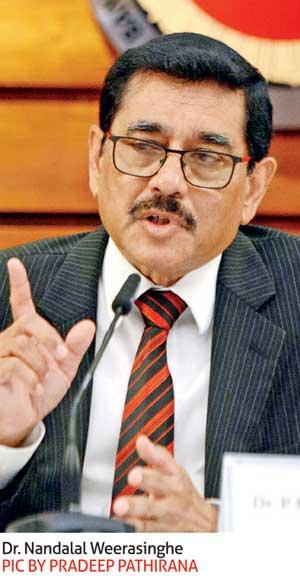05 Jan 2024 - {{hitsCtrl.values.hits}}
 By Nishel Fernando
By Nishel Fernando
Public funds would only be utilised as the last resort to meet the recapitalisation requirements of the banking sector to ensure stability within the financial system, the Central Bank said.
The need for recapitalisation would arise due to external debt restructuring, restructuring of foreign currency exposures of SOEs, bank diagnostic exercise, and forward-looking impact assessments.
“We are confident that we can ensure stability because the government has extended their support and allocated taxpayers money if needed to support the banking system. As to how that is going to be done, there is a process. If there’s a gap, the government can step in as a last resort,” Central Bank Governor, Dr. Nandalal Weerasinghe said.
Although Rupee denominated government securities held by the banking sector were excluded from the domestic debt optimisation perimeter, banks are required to focus on strengthening their capital buffers considering the recapitalisation needs that would arise going forward.
Currently, banks are being directed to submit recapitalisation plans to address capital shortfalls, if any. In particular, state-owned banks are also largely expected to be recapitalised with public funds. In the 2024 budget, Rs. 450 billion was allocated to support the capital augmentation process of the banking sector. This was based on a request from the Central Bank. In addition, it was also proposed to allocate 20 percent of the two state-owned Licensed Commercial Banks to strategic investors or the public.
“Going forward, the Bank Supervision Department will ask every bank to come up with a plan based on their assessments in addition to ours. We will then see if there is a need for the government to support, especially for the two State-owned Banks,” Dr. Weerasinghe said.
In 2023, as a structural benchmark under the IMF’s EFF programme, independent Asset Quality Reviews (AQRs) for nine domestic banks, which account for more than 90 percent of the domestically owned bank assets, were completed covering loans and advances in foreign currency, domestic currency, and foreign currency denominated financial instruments.
Central Bank also developed a roadmap for the restructuring and capital enhancement of five large banks through careful assessment of the results of AQRs, forward-looking stress testing based on macro-financial scenarios, and the impact of domestic and external debt (including FX debt granted by state banks to State Owned Enterprises (SOEs) such as Ceylon Petroleum Corporation) restructuring followed by a recapitalisation strategy to meet the potential capital shortfalls. CB noted that a similar process is being followed for the four smaller domestically owned banks that were subjected to the AQR.
04 May 2024 04 May 2024
04 May 2024 04 May 2024
04 May 2024 04 May 2024
04 May 2024 04 May 2024
04 May 2024 04 May 2024